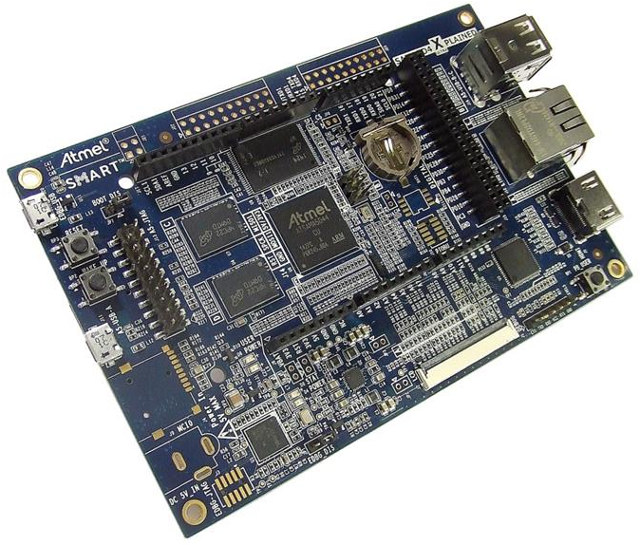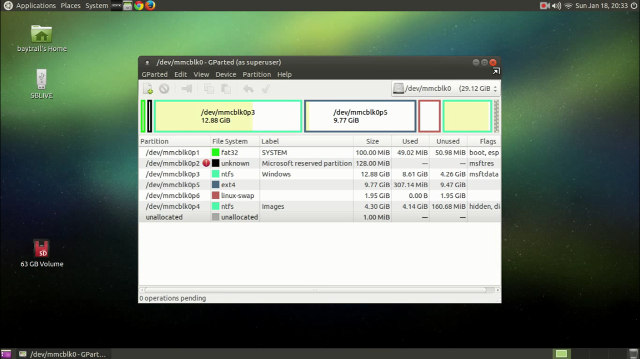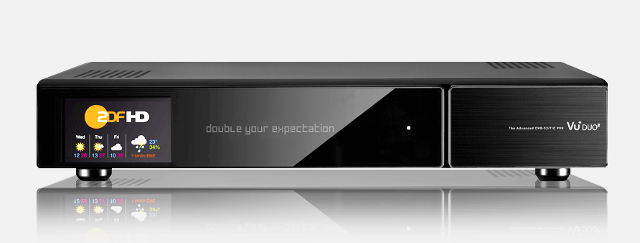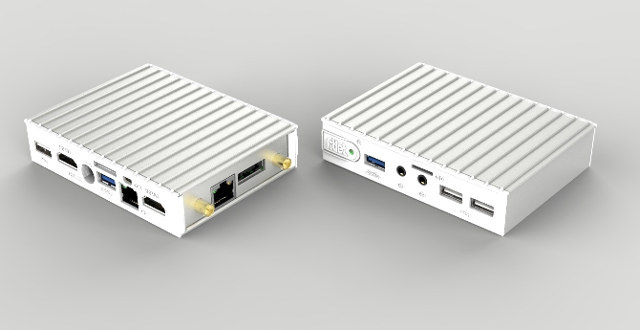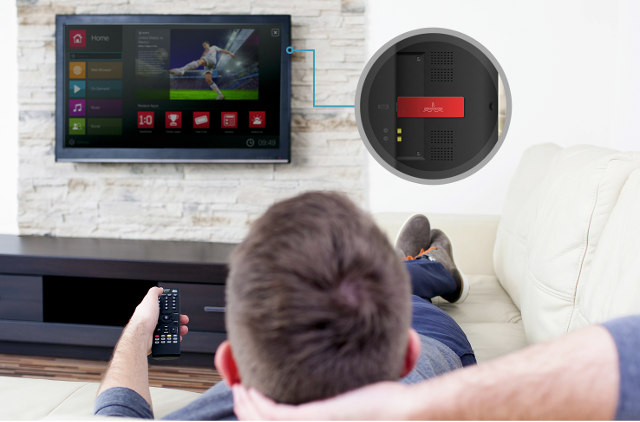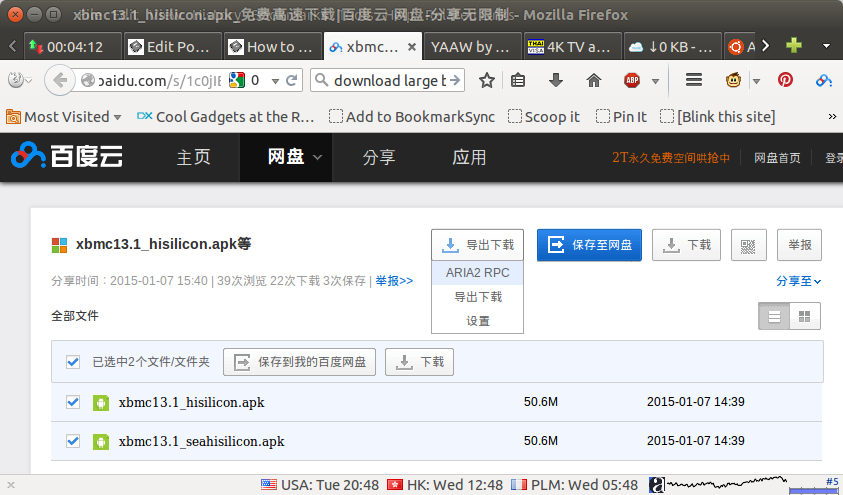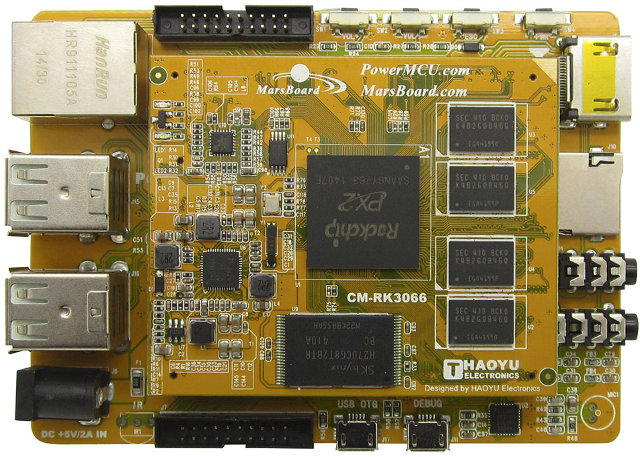Atmel has introduced an upgrade to their Atmel SAMA5D3 Xplained development board with SAMA5D4 Xplained Ultra replacing SAMA5D36 by SAMA5D44 embedded micro-processor for 720p hardware video decoding support, and adding HDMI output, extra storage and memory, etc… but losing one Ethernet port. Atmel SAMA5D4 Xplained Ultra (XLUT) specifications: MPU – Atmel SAMA5D44 Cortex-A5 Microprocessor @ 536 MHz System Memory – 2x 2Gbit DDR2 memory Storage – 4 Gbit NAND Flash, 1x 4-bit SD card connector (not populated), 1x 4-bit micro SD connector, optional serial EEPROM (SPI), one EEPROM with MAC address and serial number. Connectivity – 1x Ethernet 10/100M Display – 1x LCD interface connector, 1x HDMI port USB – 1x micro USB device connector, 2x USB host connectors Debugging – 1x 20-pin J-TAG connector, 1x EDBG connector (not populated), 1x serial DBGU interface (3.3V) Expansion – Arduino R3-compatible headers, XPRO set of connectors; ADC inputs and CAN interfaces Misc […]
Install Ubuntu 14.10 on MeegoPad T01 with a Live ISO Image
MeegoPad T01 has recently been shown to boot Ubuntu and Android, but no installation disk had been provided so far. But thanks to deadhp1, there’s now a “beta” Ubuntu 14.10 image with MATE desktop environment available for download in order to try or install Ubuntu on MeegoPad T01, and other Intel Atom Bay Trail-T devices. Before you decide to try or install the image, be aware that audio and Bluetooth are not working for now, but everything else should work, including hardware video decoding in Kodi. If your device is not using a Realtek rtl8723bs module, Wi-Fi won’t work, and you may need to use a USB Ethernet dongle to get IP connectivity. The instructions will keep your Windows 8.1 installation too, albeit I suppose you could also wipe out the Windows 8.1 partition completely and run Ubuntu only on the device. If the instructions are not followed carefully, you […]
Linux based Vu+ DVB Set-top Boxes Now Support XBMC/Kodi
Vu+ Duo2, Solo2 and Solo SE are high-end Linux based DVB receivers powered by Broadcom processors made by Ceru, and with a relatively active community of users and developers. All three models have recently received support for XBMC in their “Black Hole” firmware. Solo SE is the most recent model having been released in 2014, against Duo2 and Solo2 that have been selling since 2012 according to Wikipedia. Since I’ve never heard about these, I’ll check out Duo2, as it comes with the most features out of the three. Vu+ Duo2 specifications: SoC – Broadcom BCM7424 dual core MIPS processor @ 1.3 GHz with VideoCore IV GPU System Memory – 2GB RAM Storage – 1 GB NAND flash + SATA III interface for 2.5″ and 3.5″ HDD (internal) + eSATA + Video Output – HDMI, SCART, Composite, and Component (YPbPr) Audio Output – HDMI, stereo audio, and optical S/PDIF Tuners – […]
AMD Mullins Powered Compulab Fitlet mini PCs Run Linux Mint or Windows
Finally an alternative to the recent wave of Intel Bay Trail-T mini PCs and sticks thanks to Compulab Fitlet mini PCs powered by AMD Mullins APUs, namely AMD A4 Micro-6400T and E1 Micro-6200T, with Radeon graphics, supporting up to 8GB RAM, mSATA, up to two HDMI port, up to four Gigabit Ethernet ports, and more. There are three Fitlet models: Fitlet-i, Fitlet-X with four Gigabit Ethernet port, and Fitlet-B, the entry-level option. In Q2 2015, a MintBox mini model running Linux Mint will also be released. Fitlet-i specifications: SoC – AMD A4 Micro-6400T 64 bit quad-core processor up to 1.6 GHz with Radeon R3 Graphics (4.5W TDP) System Memory – Up to 8 GB DDR3-1333 (1x SODIMM) Storage – mSATA up to 1 TB (SATA 3.0), power eSATA (5V), and micro-SD slot (SDXC support, rate 25 MB/s) Video Output – Dual HDMI 1.4a up to 1920×1200@60Hz Audio I/O – HDMI, S/PDIF […]
Broadcom Unveils BCM725x SoCs for STBs and TV Sticks
Broadcom has recently announced two new SoCs, namely BCM7250 and BCM72502, respectively targeted at OTT streaming media player form factor and HDMI stick or dongle applications. Both feature Broadcom’s Brahma-B15 ARMv7-A cores, support 10-bit H.265, HDMI 2.0, MHL 2.0, and up to to 4×4 5G WiFi via BCM4366 WiSoC. Key features listed by Broadcom for both SoCs: High Efficiency Video Coding (HEVC)/H.265 compression 6000 DMIPS B15 ARMv7-A CPU 1.0 Gpix/s OpenGL ES 3.0 3D GPU Supports HDMI 2.0 with HDCP 2.2 or MHL 2.0 digital video output PCIe connectivity to Broadcom BCM4366 4×4 carrier-grade 5G WiFi 480/576p30 transcode 1080p60 10-Bit HD HEVC decode and 4Kp60 upscale High Performance DDR3/DDR4 system memory interface Supports Android, Chromium, DIAL, DLNA CVP2, Miracast protocols Supports Broadcom Trellis Multi-Application Framework and DTVKit software stack The company can also provide reference platforms with 2×2 and 4×4 5G WiFi connectivity options via a high-speed PCIe interface, and announced […]
Downloading Files on Baidu, or via HTTP, Bittorrent or Metalink in Linux with BaiduExporter, Aria2 and YAAW
Most firmware files distributed by the manufacturers are uploaded to Baidu, but I’ve found the service not to be always reliable, especially for larger files. In Windows, people are recommended to use Baidu software (BaiduYunGuanjia), but there’s not such tool in Linux, so instead I investigate for command lines tools to download files from Baidu, and this lead me to two interesting tools called Aria2, a “lightweight multi-protocol & multi-source command-line download utility. It supports HTTP/HTTPS, FTP, BitTorrent and Metalink”, and YAAW “Yet Another Aria2 Web Frontend” with allow to start and monitor download locally or remotely. But let’s start with the first tool I found: pan-baidu-download, a Python script to download files from Baidu. To install it:
|
1 2 |
git clone https://github.com/banbanchs/pan-baidu-download.git cd pan-baidu-download |
We also need to install some dependencies (assuming python 2.7.x is already installed):
|
1 |
sudo apt-get install python-pip aria2 |
and then you can start downloading files as follows:
|
1 |
python bddown_cli.py download http://pan.baidu.com/s/somerandomcharacters |
But after posting a bug about password-protected […]
$60 MarsBoard Rockchip PX2 Development Board Runs Ubuntu, Debian, openSUSE, or Android 4.4
Haoyu Electronics has made a new board similar to their MarsBoard RK3066, but instead of using a CPU module with Rockchip RK3066, they’ve used the industrial version of the chip called Rockchip PX2 dual core Cortex A9 processor. The board is also comprised of a baseboard and CPU module (CM-PX2), and based on the name of the pictures it’s using the exact same PCB: CM-RK3066 SoM, and SOM-RK3066 baseboard, but they simply replaced RK3066 by PX2, and increased the NAND flash capacity to 8GB. CM-PX2 Computer-on-Module: SoC – Rockchip PX2 dual core ARM Cortex A9 @ 1.4 GHz + Mali-400MP4 GPU System Memory – 1GB DDR3 Storage – 8 GB NAND Power Management Unit – TPS659102 Misc – TX indicator LED use for debug, Power Indicator LED 10/100M Ethernet PHY – LAN8720A Connectors – 2x 100- pin for baseboard connection, 40-pin connector (unsoldered) Dimensions – 70 x 58 mm SOM-RK3066 […]
Patchsets for Nvidia Tegra K1 “Denver” Submitted to Linux Mainline
Some patchsets have been submitted for Nvidia Tegra 132 a few days ago to the Linux ARM Kernel mailing list. Tegra 132 is the codename for the 64-bit version of Tegra K1, and they’re also a mention of Norrin64 FFD board, that should be a Chromebook reference design.
|
1 2 3 4 5 6 7 8 9 10 11 12 |
diff --git a/include/soc/tegra/fuse.h b/include/soc/tegra/fuse.h index 8e1249474e84..b5f7b5f8d008 100644 --- a/include/soc/tegra/fuse.h +++ b/include/soc/tegra/fuse.h @@ -21,6 +21,7 @@ #define TEGRA30 0x30 #define TEGRA114 0x35 #define TEGRA124 0x40 +#define TEGRA132 0x13 #define TEGRA_FUSE_SKU_CALIB_0 0xf0 #define TEGRA30_FUSE_SATA_CALIB 0x124 |
Tegra114 and Tegra124 are the codename for Tegra K1 32-bit processor with Tegra124 clocked at a higher frequency. Norrin64 board dts does not seem included in the patchsets, but it’s available from Chromium OS code, and shows it’s using 2GB RAM too. That also means Chrombooks like Acer Chromebook 13 (CB5) or HP Chromebook 14 with the 32-bit version of the Tegra K1 might soon get an upgrade to the 64-bit version. Thanks to David for the tip. Jean-Luc Aufranc (CNXSoft)Jean-Luc started CNX Software in 2010 as a part-time endeavor, before quitting his job as a software engineering manager, and starting […]


